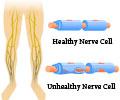New neuropathic pain molecule discovered that may prevent the onset of peripheral neuropathy that usually follows chemotherapy treatment in cancer patients.
TOP INSIGHT
Cancer patients no longer need to pay the price for getting their tumors removed via chemotherapy as a new molecule has been discovered that will prevent the occurrence of the neuropathic pain that usually follows the procedure.
Highlights:
- New molecule found that can arrest the onset of chemotherapy-induced peripheral neuropathy in cancer patients.
- Peripheral neuropathy is an adverse effect following the use of chemotherapy agents usually in the case of colon cancer patients.
- This complication, so far, regarded as a "price to pay" for curing the cancer can be averted with the discovery of the new drug.
The complication, has a negative impact on the quality of life of the patient, as it increases their care expenses and hinders them from performing their daily activities independently. These reasons often lead to dose reduction or early termination of chemotherapy, with the potential decrease of survival chances that entails.
The new molecule that has been identified seems to be a candidate to prevent the onset of this adverse effect.
Study
A Phase 2b clinical trial (randomized with placebo) was conducted through a public-private partnership. The results from this clinical trial comprising of cancer patients proved that the molecule causes a decrease in the appearance of disorders associated with nerve dysfunction. Even though the new molecule could only be used at low doses in relation to the duration of the chemotherapy treatment (due to the prior safety data), positive results were still obtained. There is now enough information to be able to extend the duration of the treatment.Dr. Bruna, who led the trial explains that “The trail has allowed us to get a great deal of scientific information - effect on pain, pathophysiology - and draw conclusions as to the potential of the drug in the prevention of neuropathies during cytostatic treatment. Given the usual pace of clinical trials and drug agencies following fast-track approval processes in severe or orphan pathologies, this new drug could potentially reach the market soon, since it would be the first available treatment to avoid this type of neuropathy. In addition, it has other medical uses as a non-opioid analgesic".
Peripheral Neuropathy
Peripheral neuropathy (neuropathy meaning nerve disease or damage) is damage that occurs to the peripheral nervous system (PNS). The PNS is the bridge that transmits information from the central nervous system to the various parts of our body. While neuropathy can be painful and potentially debilitating, very few forms are fatal.Symptoms that occur are numbness or tingling, pricking sensations and muscle weakness. Sometimes, stimuli that usually do not cause pain can provoke pain; another symptom could be a very intense experience of touch. Patients could suffer from these symptoms over a period of days, weeks, or years. The pain can be acute or chronic.
Chemotherapy-induced Peripheral Neuropathy
Chemotherapy-induced peripheral neuropathy (CIPN) is often a severe side effect associated with several chemotherapeutic agents including platinum agents, taxanes, vinca alkaloids, thalidomide, and bortezomib.In fact, a recent meta-analysis of more than 4000 chemotherapy-treated patients found the prevalence of CIPN to be
- 68.1% within the first month of chemotherapy treatment
- 60.0% at 3 months
- 30.0% at 6 months
There is no doubt that improving pain control and reducing the occurrence of severe neuropathy is undoubtedly the most prominent benefit of the development of this novel drug.
References:
- Jordi Bruna, Sebastián Videla, Andreas A. Argyriou, Roser Velasco, Jesús Villoria, Cristina Santos, Cristina Nadal, Guido Cavaletti, Paola Alberti, Chiara Briani, Haralabos P. Kalofonos, Diego Cortinovis, Mariano Sust, Anna Vaqu�, Thomas Klein, Carlos Plata-Salamán. Efficacy of a Novel Sigma-1 Receptor Antagonist for Oxaliplatin-Induced Neuropathy: A Randomized, Double-Blind, Placebo-Controlled Phase IIa Clinical Trial. Neurotherapeutics, 2017; DOI: 10.1007/s13311-017-0572-5
- What is peripheral neuropathy? - (https://www.ninds.nih.gov/Disorders/Patient-Caregiver-Education/Fact-Sheets/Peripheral-Neuropathy-Fact-Sheet)
- Addington J, Freimer M. Chemotherapy-induced peripheral neuropathy: an update on the current understanding. F1000Research. 2016;5:F1000 Faculty Rev-1466. doi:10.12688/f1000research.8053.1.
Source-Medindia
 MEDINDIA
MEDINDIA





 Email
Email










